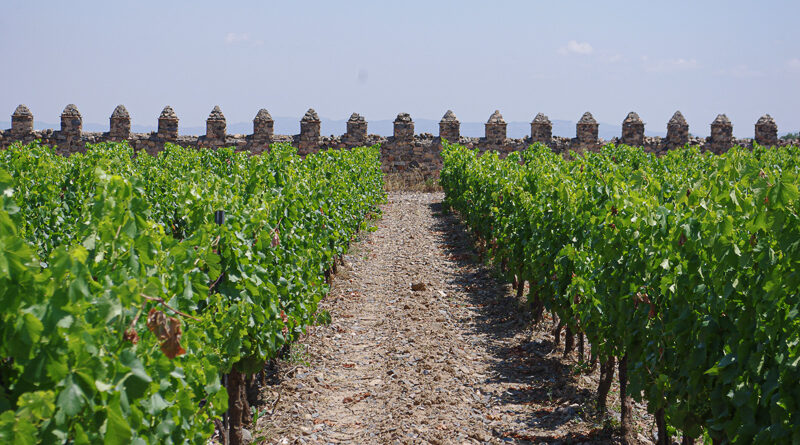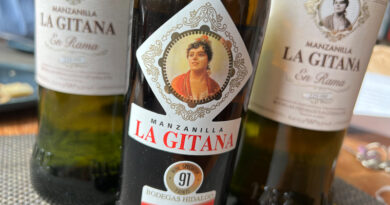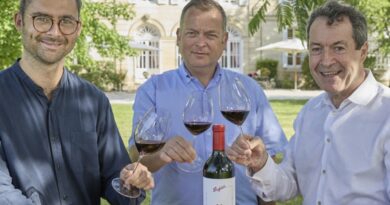Torres Anthologia: high-end wines from this important Spanish winery
Miquel Torres led this tasting of the top wines of Torres from the family museum, with a backdrop of some ancient amphora. Torres aren’t ancient, but they are quite old, and this year they are celebrating the 150th anniversary of the founding of the Torres winery, which was in 1870. ‘It is a very interesting moment for Familia Torres,’ he says, with the recent change from the fourth to the fifth generation that saw him take charge a few years back. ‘In the past 30 years we have been working hard to acquire special vineyards,’ he says. Anthologia is the name used to refer to the top wines, which come from some of these special sites.
As well as running us through the wines, Miquel told us of some of the new projects that Torres is involved with. ‘Rias Baixas is a focus,’ he says. ‘Some years ago I was lucky enough to find Pazo Torre Penelas, an estate from the 15th century in Salnes. It has granitic soils. It’s a beautiful place and they used to make wine here in the past. The history was lost and I wanted to recuperate this.’ The vineyards are all planted in parral (the local name for pergola). ‘One of the things I wanted to investigate was granite: in the past everything was made with granite. I wanted to replicate a wine fermented in granite, and I asked a specialist to make 730 litre granite fermenters. They are egg shaped. It has been very interesting. We don’t need to cool the eggs because the temperature inertia is fantastic, and they enhance the sensation of salinity.’ Their first vintage was 2018, but this is not released yet.
They have also been busy in Priorat. ‘We looked for the highest mountain possible where we can plant a vineyard,’ he says. They found one at 780 m, which is the highest they can go and still have slate soils. ‘It used to be planted but was abandoned. It took a few years to find the owners, as they had lost track with the property of their grandparents. It is very windy.’ The view is quite stunning, and they have planted Garnacha and Carinena – a couple of hectares in all. ‘It is really magical,’ says Miquel. ‘This is a project for my children.’
In Penedes they are still trying to find the heritage vines. They have found some ancient land where viticulture was established in the past, but abandoned. They are trying to recuperate these sites. One site Les Esctostes, is at 700 m and they are planting an ancient recovered variety Forcada there, on calcareous soils.
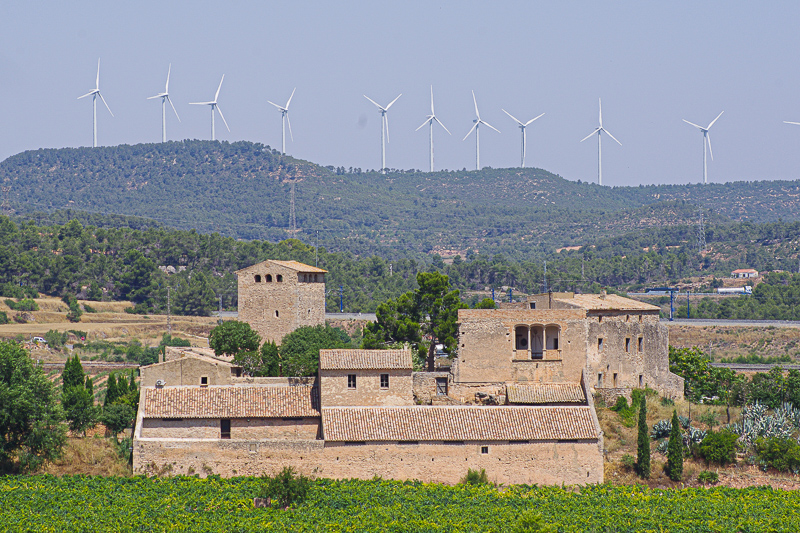
Torres Milmanda 2017 Conca de Barberà, Spain
13.5% alcohol. pH 3.1, 6 g/l sugar. Barrel fermented with 50% malolactic fermentation. This is in the south of the Penedes. It’s an appellation with various soil types, ranging from calcareous to alluvial and even some slate. The vineyards at Milmanda surround the fortified farm that used to be owned by the Cistercian monks, built in the 12th century. The farm was based on cereals and wine, and it was purchased in the late 1970s. The first vintage was 1985. The soils are iron-rich with silt-rich calcareous clay. There’s a high proportion of clay, which is good for this dry climate and for white wines you need soils that retain water and delay ripening. The soils are also quite deep. The Serra de Prades mountains blocks the warm winds from the Mediterranean. This is a fresh expression of Chardonnay, but also quite powerful, with vivid citrus fruits, a hint of fennel and some spiciness, as well as subtle nut and honey notes. There’s a lovely brightness with good acidity here (very low pH) and potential for development. Very appealing, showing restraint and purity as well as some tension. 93/100
Torres Mas Le Plana 2016 Penedès, Spain
14.5% alcohol. 18 months in French oak (85% new). This 29 hectare vineyard was planted in 1964/65 from cuttings smuggled by Jean Leon from Bordeaux. During the last ten years they have done lots of work increasing the biodiversity in the vineyard with wildlife corridors and insectaria, and they are experimenting with electric tractors. This vineyard helps them to trial things that can then be rolled out to other vineyards. The soils are alluvial with gravels lower down, which are quite deep (high calcium carbonate content), and on the other side higher up they have shallower stratified soils that ripen early and give stronger tannic structure. This is aromatic with sweet red cherries and blackcurrant, as well as some plum and spice and liqourice. The palate is fine grained with a hint of mint and some refined oak, but also plenty of harmony. It’s a ripe wine, but a very well balanced one with a sense of harmony, coupling red fruits with a bit of black, and very refined tannins. It should age effortlessly, but it’s also approachable now. Classically styled. 94/100 (8700 cases)
Torres Reserva Real 2016 Penedès, Spain
This is unique in the Penedès in that it has slate soils at Finca Les Arnes. It is Silurian slate that’s 420 million years old. They are free-draining and the roots develop to 60 cm, and few penetrated further. It’s a blend of Cabernet Sauvignon (75%), Merlot (12%) and Cabernet Franc (13%). Aged for 18 months in new oak, pH 3.33 (low for a red) and 14.5% alcohol. Deep coloured, this is quite structured and intense with powerful blackcurrant and berry fruit, with firm tannins. So much more intense than Mas Le Plana with more rustic structure and primary fruit. There’s a touch of spicy oak here: lots happening, and I think this has potential for ageing. Very intense. 93/100 (200 cases)
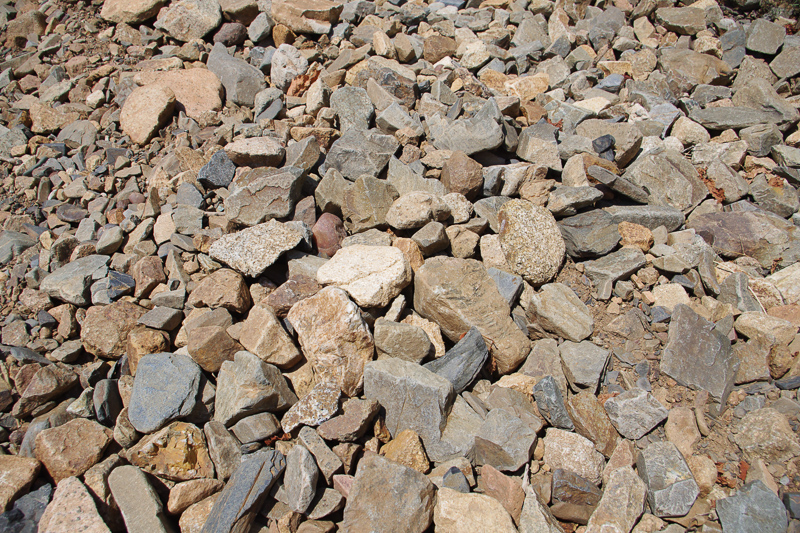
Grans Muralles 2016 Conca de Barbera
Close to Milmanda, but the soils are so different. This is named after the wall surrounding the vineyard. Milmanda is calcareous clay – the soils here are chunky rocks of slate with some gravel. These are cooler soils than in Priorat in that they are deeper soils, which adds some freshness to the wines. The soils are a combination of the slate rocks from the mountain, combined with alluvial soils from the river: it’s quite a unique soil. The varieties include Garnacha, Carineña, Monastrell, Garró (an ancestral variety) and Querol (another ancestral variety, with small grapes and no seeds, and a huge amount of skin: even a small percentage can change the blend). Lower extraction regime these days, which is a good thing, and this is aged for 18 months in new French oak. Really warm and aromatic on the nose with lovely berry fruit and cherry aromatics, with some warm garrigue notes. The palate is ripe, rounded and smooth with sweet cherries and berries, some liquorice, fine spices, a hint of mint and some dried herbs. Very stylish with lovely ripeness, real finesse, and also a lovely Mediterannean personality. Quite enticing. 96/100 (677 cases)
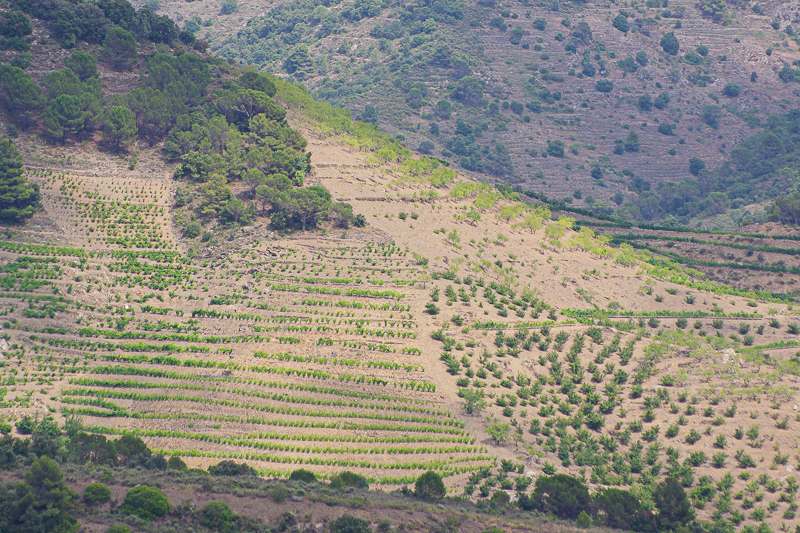
Torres Mas de la Rosa Porrera 2017 Priorat, Spain
This is a vineyard in Porrera at 470 m altitude, which is high for the region. It’s a beautiful vineyard on the top of a hill. These grapes were being used for Perpetual, but each time they vinified these grapes they were unique. ‘The connection with terroir was very pure,’ says Miquel Torres. ‘I had to convince my father, but in the end I told him he had his dreams, and this is mine.’ This is a small parcel of 1.9 hectares, with vines at least 75 years old, of Garnacha and Cariñena. The soils are pure slate, and the vines have very low vigour, and produce very few grapes. Labour in the vineyard is by hand and horse, and first vintage was last year. 14% alcohol, pH 3.26, low extraction of 8-9 days. ‘The best part of Carinena is the first part, the floral part,’ says Miquel Torres. The result is lovely. This is elegant and fine, and has a silky texture to the sweet cherry and plum fruit with some fine herbal notes. It’s pure, fresh, vivid and quite floral with lovely purity. There’s a red fruit focus and some minerality, with fine spices. Such precision here with some delicacy and elegance: a beautiful expression of this remarkable place. It’s certainly ripe and sweetly fruited, but the winemaking has tamed the potential excess. 95/100
Find these wines with wine-searcher.com

